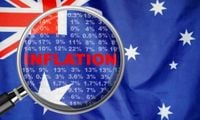The Australian sharemarket closed with its first monthly gain since January on April 29, 2025, as investors reacted positively to signals from Wall Street, shrugging off disappointing US economic data. The S&P/ASX 200 Index rose by 0.7 percent, or 55.6 points, to close at 8126.2 points, marking a notable 3.6 percent increase over the month. The All Ordinaries also saw a rise of 0.6 percent.
Despite a drop in US job openings and a significant decline in consumer confidence to a five-year low, the S&P 500 Index managed to climb for a sixth consecutive session. This upward trend was bolstered by comments from US Treasury Secretary Scott Bessent, who indicated progress on trade deals with countries including Japan and India. However, US futures were pointing lower ahead of earnings reports from major tech companies like Microsoft and Meta, as markets braced for the impact of US President Donald Trump’s reciprocal tariffs.
Russel Chesler, head of investments at VanEck, likened the current market conditions to a pendulum that has yet to find its equilibrium. “The market is like a pendulum swinging at the moment – and it hasn’t quite found equilibrium,” he remarked, noting that while the market's range is narrowing, uncertainty about its direction remains.
Among the sectors, technology stocks led the gains, with the Commonwealth Bank of Australia (CBA) rising 2.2 percent to $166.60, edging close to its all-time high of $168. TechnologyOne advanced by 2.5 percent to $30.06, while WiseTech increased by 1.1 percent to $88.52. However, the mining sector faced challenges as gold prices continued to decline, with Newmont falling 1.7 percent to $82.07 and Evolution dropping 2 percent to $7.83.
In the more defensive areas of the market, utilities saw a sell-off, with Origin Energy retreating 1.4 percent to $10.64 after reporting a quarter-on-quarter decline in LNG revenue. Coles also edged down 0.8 percent to $21.22, despite a 13.7 percent increase in sales from its premium range, Coles Finest, for the three months ending March 30. Ora Banda Mining faced a significant drop of 6.1 percent to 99.5¢ after lowering its full-year production guidance due to downtime at its processing plant. Alcoa retreated 1.7 percent to $38.95 following a nationwide power outage in Spain that affected its operations at the San Ciprian smelter.
Investors continued to sell shares in Northern Star Resources, which closed down 3.5 percent at $19.18 after the company lowered its output guidance for the 2025 financial year, citing higher maintenance costs and increased royalties.
On the inflation front, the Australian Bureau of Statistics (ABS) released its quarterly consumer price index (CPI) on April 30, 2025, revealing that inflationary pressures have eased. The CPI rose by 0.9 percent for the March quarter, a significant increase from the 0.2 percent rise in the previous December quarter. Over the past year, the CPI rose by 2.4 percent, remaining unchanged from the December 2024 quarter.
The trimmed mean inflation, which many consider a better indicator of underlying inflation, fell to 2.9 percent, down from an adjusted 3.3 percent in the December quarter. This is the lowest rate since December 2021, suggesting a gradual easing of inflationary pressures. Housing costs rose by 2 percent over the year, while other sectors such as health, alcohol and tobacco, and education also saw noticeable price increases.
The Reserve Bank of Australia (RBA) has indicated that it targets an inflation rate between 2 percent and 3 percent before it will consider reducing the official cash rate (OCR). Earlier this month, the bank decided to hold the OCR at 4.10 percent, citing uncertainties around inflation and economic activity. However, many analysts believe that the RBA may cut rates in May, especially given the easing inflationary pressures.
Luci Ellis, chief economist at Westpac Group, noted in a recent report that the turmoil in global markets could lead to a rate cut. “A few months ago, the RBA’s main concern was that a still tight labour market would keep domestic inflation pressures sticky,” she stated. “The turmoil abroad has, however, changed the game and flipped the risks.”
Market expectations are high for the RBA's upcoming meeting on May 19-20, with all four of Australia's Big Four Banks forecasting rate reductions this year. In anticipation of the RBA's decision, several banks have already begun to reduce their fixed mortgage rates. Recently, Macquarie Bank cut its two- and three-year fixed interest mortgage rates to 5.19 percent, the lowest on the market.
As the economic landscape continues to shift, the latest inflation figures are likely to inject a sense of optimism into the market. Homeowners and investors are hopeful that the falling inflationary pressures will lead to further rate relief, providing much-needed support in uncertain times.





